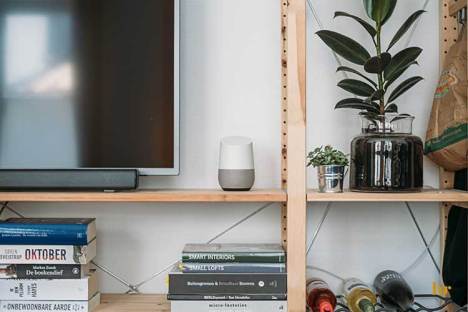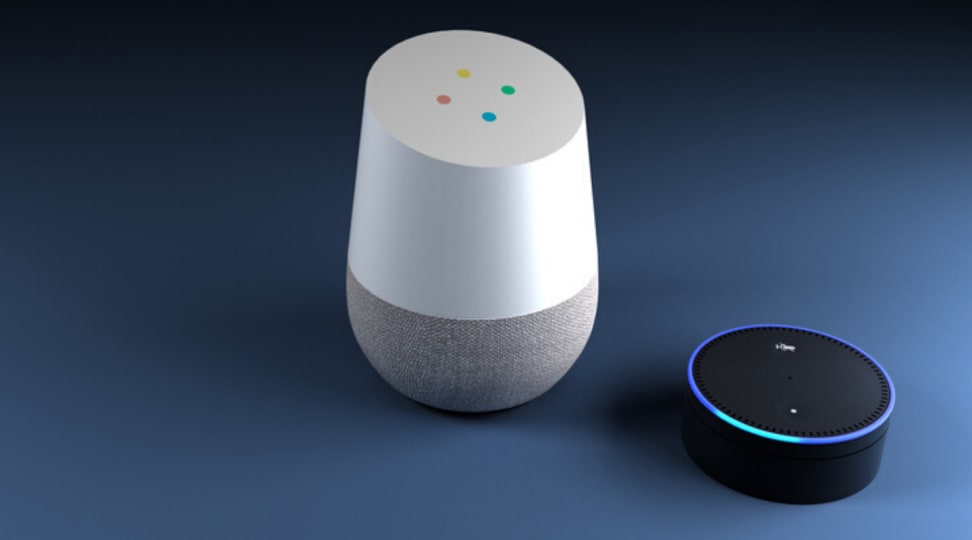Smart speakers play a central role in smart homes and make voice control a seamless experience.
With so many different smart speakers, Google Home and Amazon Echo are among the most popular.
So when it comes to the question of Google Home vs Amazon Echo, which one will be better?
Since Amazon kicked off the smart speaker wars with the original Echo in 2015, they've sold over 100 million devices.
Although Google was later with the launch of Home in 2017, they have caught up.
Last year, Google Home smart speakers surpassed Echo devices for the first time.
Together we'll explore whether you should go for an Amazon Echo device or a Google Home smart speaker.
Google Home vs Amazon Echo by Category
1) Google Home vs Amazon Echo: Smart Home Compatibility
Using a digital assistant for hands-free control of other smart devices is one of the main purposes of any smart speaker.
You can currently control over 60,000 smart devices with Alexa.
Google Home lets you control 30,000 devices.
What matters here is whether Alexa or Google Assistant can be used to control the devices you have in place or are considering purchasing.
As long as you have compatible devices, controlling the smart home with Google Home or Amazon Alexa is a seamless experience.
2) Google Home vs Amazon Echo: Digital Assistant
Google's major advantage in terms of digital assistant functionality is the power of search as you would expect.
Alexa, on the other hand, is a nimble virtual butler that you can configure to speak in different accents and languages.
In terms of basic features, there isn't much to choose between these AI-powered digital assistants.
If you use multiple languages, Google Assistant is the most flexible option.
The default choice is Alexa for its sheer omnipresence.
3) Google Home vs. Amazon Echo: Audio
Here, it is difficult to compare the different ranges on a constant basis.
If you're looking for a primary listening device, the only unit to consider is Google Home Max.
You can still get more than usable audio from Echo Plus and Google Home
standard, but for high quality sound it should be Max.
4) Google Home vs. Amazon Echo: Design
Google and Amazon offer large cylindrical devices in the form of Echo and Google Home.
Neither of these will win design awards, but both are more than functional.

If you're looking for a smart speaker for your bedroom, Echo Dot or Echo Spot work well.
Google Home Mini is configured to compete with these.
Larger speakers take up more space, so make sure you have enough room to install them.
Overall, all of these smart speakers are designed to fit in rather than stand out. And none of the models are particularly over-the-top design-wise.
5) Google Home vs Amazon Echo: Skills and Research
Both digital assistants allow you to set up routines to automate smart home control.
Alexa has 80,000 skills, but Google doesn't fall behind in flexible and powerful search capability.
You will tend to get more complete answers to your requests with Google Home than with Alexa.
For all basic tasks, like organizing your day and dealing with traffic or the weather, both virtual assistants have their own advantages and disadvantages.
As with all aspects of this purchasing decision, you should focus on the ecosystem that best meets your needs.
6) Google Home vs Amazon Echo: Music and Video Streaming
You'll have access to all the same types of streaming channels on Home and Echo.
You should ask yourself the following questions:

Do you really need video and do you watch video content frequently?
If so, you need Google Nest Hub or one of the Echo Show or Echo Spot smart displays.
Otherwise, you can focus on the other key issues.
How important is high-end audio to you? If you're an audiophile, Google Home Max is the only speaker to consider.
7) Google Home vs Amazon Echo: Cost
If you're looking for a good price for smart home control and beyond, Google Home Mini and Echo Dot are great options.
Amazon wins in the midrange by offering a lot more features and flexibility with Echo Plus than you'll find with the base Home model.
The audio is better quality, you'll get a Zigbee hub, and you won't need to overpay for that extra oomph.
Google steals the premium speaker title with Home Max. None of the Echo devices can compete on this front, which is one of the reasons Amazon is working on a high-end Echo.
But don't focus on these two brands alone, because other audio players are in the ring and integrating Alexa and Google assistants.
